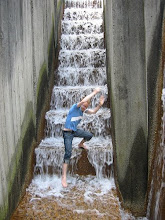 Spring is in the air this morning. After a long hard winter, I can hardly wait for the first buds to flower here in DC.
Spring is in the air this morning. After a long hard winter, I can hardly wait for the first buds to flower here in DC.
c. 1780 in Freeport, ME
4 hours ago
 The January 2010 issue of the World of Interiors featured a stair that I just couldn't get out of my head; it looked so familiar. The Copenhagen police headquarters is a masterpiece of modern Neoclassicism from the 1920s that contains this gem.
The January 2010 issue of the World of Interiors featured a stair that I just couldn't get out of my head; it looked so familiar. The Copenhagen police headquarters is a masterpiece of modern Neoclassicism from the 1920s that contains this gem. This image looking up towards the skylight finally reminded me of where I had seen this before. Nature!
This image looking up towards the skylight finally reminded me of where I had seen this before. Nature! 
 Arguably, the most important room to the mistress of a 18th century house is her boudoir. The derivation of the word is from the French word Bouder or 'to pout' . Here she can unwind in her own personal space, far from the worries of her household (simliar to a 'mancave' today I think)! Technically, the boudoir is a private sitting or dressing area off of a bedroom. In the case of the Petit Trianon, this little room has some big impact, impressive features!
Arguably, the most important room to the mistress of a 18th century house is her boudoir. The derivation of the word is from the French word Bouder or 'to pout' . Here she can unwind in her own personal space, far from the worries of her household (simliar to a 'mancave' today I think)! Technically, the boudoir is a private sitting or dressing area off of a bedroom. In the case of the Petit Trianon, this little room has some big impact, impressive features! The room lies in the northeast corner of the first floor, in between the Salon (to which there is a jib or secret door) and Marie Antoinette's bedroom, marked in blue above.
The room lies in the northeast corner of the first floor, in between the Salon (to which there is a jib or secret door) and Marie Antoinette's bedroom, marked in blue above. Here in her private sanctuary, Marie Antoinette would entertain her closest friends (the bedroom was still a semi-public space at the time) and nap. Rather than draperies which posed a security risk, the room was lined with very simple boiseries with inset mirrors that at the turn of a crank in the room below, recede into the wall exposing the window on the east wall and the french doors to the terrace on the north wall.
Here in her private sanctuary, Marie Antoinette would entertain her closest friends (the bedroom was still a semi-public space at the time) and nap. Rather than draperies which posed a security risk, the room was lined with very simple boiseries with inset mirrors that at the turn of a crank in the room below, recede into the wall exposing the window on the east wall and the french doors to the terrace on the north wall. Many of the details match that of the adjacent bedroom, including the pale blue color scheme. However, as this is a less public space, the boiseries are even simpler than in the bedroom. They saved the most showy spaces for the public, much as we do today in our own homes. The level of ornateness often would correspond to the level of privacy held by the space.
Many of the details match that of the adjacent bedroom, including the pale blue color scheme. However, as this is a less public space, the boiseries are even simpler than in the bedroom. They saved the most showy spaces for the public, much as we do today in our own homes. The level of ornateness often would correspond to the level of privacy held by the space. Above you can see the mirror half covering the window. While in the full height position, the mirrors act as part of the paneling and you can't even tell they are covering anything. A daybed (for naps or lounging) as well as a tea table with comfortable chairs furnish the room.
Above you can see the mirror half covering the window. While in the full height position, the mirrors act as part of the paneling and you can't even tell they are covering anything. A daybed (for naps or lounging) as well as a tea table with comfortable chairs furnish the room. I wish I had a better photograph of the fireplace than the one above, but the drawing below shows it in detail. Beautiful white marble, delicate carvings and the diminutive scale emphasize the femininity of the small space.
I wish I had a better photograph of the fireplace than the one above, but the drawing below shows it in detail. Beautiful white marble, delicate carvings and the diminutive scale emphasize the femininity of the small space.
 Here you can see the mirror from above which is half covering the above window and starting to be visable in the servants quarters.
Here you can see the mirror from above which is half covering the above window and starting to be visable in the servants quarters. 

| Blog: |
| ArchitectDesign |
Topics: |
| design, movies, washington |



